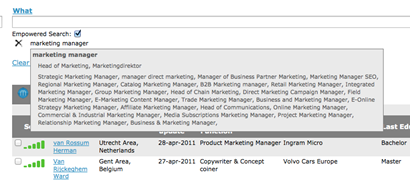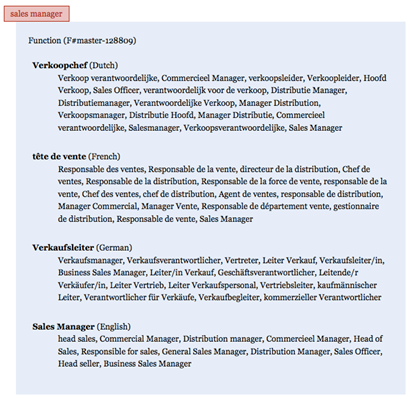Actonomy Matching quality

Gent. We all know it by now : matching is a fairly complex process and the quality of matching depends on more than just similarities between keywords! The quality of matching depends on how easily the essential characteristics of one’s profile can be detected. Once the matching engine knows what is essential, flexibility in matching configuration and complexity of matching models is key to get a final best and perfect match.
The system needs to be trained in order to understand the essential characteristics. The more concepts the system can detect in a profile, the better the matching will be! And that is the reason why Actonomy has been known for years: As an early innovator of concept modelling in our ontology, in which we have been modelling the HR world for years!

above: related concepts for ‚marketing manager‘ Source: Actonomy
Need for synonyms and related concepts : Actonomy’s power
If similarity between keywords is not the key to good matching, then what is it? The answer is : concepts, their synonyms and related concepts!
If someone is looking for a ‚graphic designer‘, then there are probably hundreds of related words… and all those words – or concepts – can be used in the matching process to define if there is a match! That is why Actonomy has developed thousands of lists over the years with concepts that are either synonyms or related with each other.
Just think , for example, of how many other words / concepts are related to ‚recruiting‘, and if found in one’s profile, are an indication that the profile could have a match with ‚recruiting‘ related jobs. Actonomy understands that hundreds of words are related, all leading into better matching.
Actonomy has created a huge database containing thousands of jobtitles all with their synonyms and related job titles…. and more … also thousands of skills that are related to these jobtitles. If you are looking for a CFO, you might as well have a look at ‚financial director‘, ‚financial manager‘, but also to profiles with experience in ‚financial management‘. So the link between skills, educations and jobtitles will result in more and better results even when the jobtitle you are looking for is not mentioned in the profile!
Example : the Career Cluster

Synonyms are obvious and easy to understand : a ’software developer‘ and a ’software eningeer‘ are considered as similar. ‚Software architect‘ is not considered as similar but as related.
Some functions are related but are considered to be higher in the organisation, others are related and considered to be on the same level. This is what we call a career cluster : A set of functions that are related because they are considered as next steps in someone’s career or because the related functions imply similar skills.
A ‚graphical designer‘ and a ‚webdesigner‘ are not the same but share certain skills. It is of interest to find both in your result list as they might be valuable profiles.
Think of using the career cluster during the matching process and you will notice that this reflects exactly the way human beings think of how to find people! The ’sales manager‘ I am looking for, does not need to have ’sales manager‘ as a function title in his/her profile – an experienced ‚account manager‘ might be a better candidate as he/she would see this as a next career step.
Find out more about our ontology and how it could improve your matching. Contact us and we will show you how you can benefit from Actonomy!
Actonomy NV
Bomastraat 14A
B-9000 Gent
www.actonomy.com
info@actonomy.com



